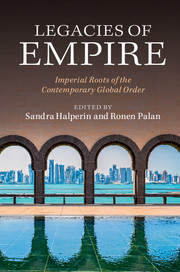Book contents
- Frontmatter
- Contents
- List of figures
- List of tables
- List of contributors
- Acknowledgments
- 1 Introduction: legacies of empire
- Part I Incomplete transitions from empires to nation states
- Part II Legacies of non-European empires in today's world
- Part III The future legacies of the American Empire
- 8 Foreign bases, sovereignty and nation building after empire: the United States in comparative perspective
- 9 Empire, capital and a legacy of endogenous multiculturalism
- 10 The assemblage of American imperium: hybrid power, world war and world government(ality) in the twenty-first century
- 11 Conclusions
- Index
- References
11 - Conclusions
from Part III - The future legacies of the American Empire
Published online by Cambridge University Press: 05 August 2015
- Frontmatter
- Contents
- List of figures
- List of tables
- List of contributors
- Acknowledgments
- 1 Introduction: legacies of empire
- Part I Incomplete transitions from empires to nation states
- Part II Legacies of non-European empires in today's world
- Part III The future legacies of the American Empire
- 8 Foreign bases, sovereignty and nation building after empire: the United States in comparative perspective
- 9 Empire, capital and a legacy of endogenous multiculturalism
- 10 The assemblage of American imperium: hybrid power, world war and world government(ality) in the twenty-first century
- 11 Conclusions
- Index
- References
Summary
One of the core assumptions spanning the disciplinary fields of international law, political science and international studies is the idea that a new political order, known as the Westphalian system, emerged in Europe in the seventeenth century and then colonized the entire world. According to this assumption, this new order was based on the principles of state sovereignty and national self-determination. Along its historical journey, it gathered additional attributes, among them perhaps the most important being nationalism, capitalism, industrialization and liberal internationalism. Historians debate, of course, whether the series of treaties signed in Augsburg and Nuremberg in 1648 were of such world-shattering importance, or whether the new order emerged in an evolutionary rather than revolutionary manner over two, three perhaps even four centuries. Less debated, however, is the core conceptual paradigm associated with the Westphalian thesis: a paradigm that treats the world as essentially divided among same-like political communities, each distinct in having their own separate political processes. The problem is that analysis tends to begin by envisioning a world separated into bounded national units.
This conceptual paradigm, which may be described as the ‘nationalist paradigm’, is what the contributors to this volume have sought to challenge. They advance a common claim: that the nation state model that is, at most, about two hundred years old, emerged in and out of conditions of imperial political organizations that have controlled large swathes of the earth for at least four millennia.
- Type
- Chapter
- Information
- Legacies of EmpireImperial Roots of the Contemporary Global Order, pp. 243 - 249Publisher: Cambridge University PressPrint publication year: 2015



